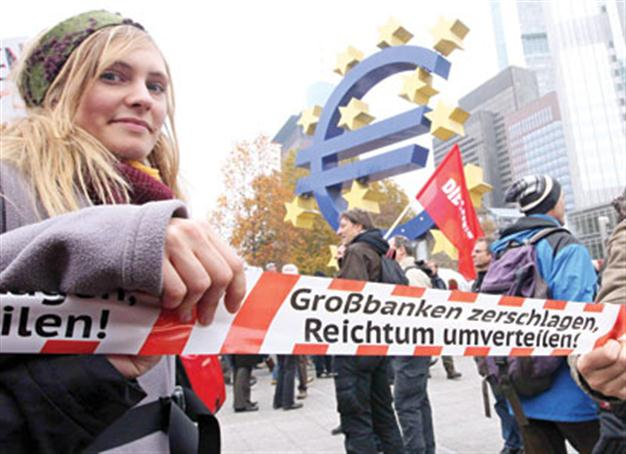Eurozone growth slows in 3rd quarter, signalling recession
BRUSSELS - Reuters

Demonstrators hold up a tape reading ‘break up big banks, reallocate prosperity!’ as they form a human chain close to European Central Bank in Frankfurt am Main, Germany, on Nov 12. AFP photo
The 17-nation eurozone economy grew a modest 0.2 percent in the third quarter from the second, the EU said yesterday. The figure owed much to stronger growth in France and Germany, but economists said the bloc is almost certainly heading for a recession.
Meanwhile, the austerity-hit Greek economy contracted by 5.2 percent in the period.
Eurozone growth for the July-September period was right in line with the expectations of economists polled by Reuters. The 0.2 percent expansion comes despite the sovereign debt crisis that is badly weakening business confidence in many countries and putting consumers off spending.
Germany and France, the eurozone’s two biggest economies, grew 0.5 percent and 0.4 percent respectively, Eurostat said, helped by consumer spending and business investments, particularly in Germany.
“The fact that the real economy still managed to grow amidst the escalating debt crisis is somewhat of a relief,” said Martin van Vliet, an economist at ING. “However, looking beneath the surface, things don’t look so rosy.”
A nasty mix of inflation, slowing exports and rising unemployment in the eurozone bode poorly and many economists expect a mild recession in Europe from the fourth quarter. European Central Bank (ECB) President Mario Draghi has also predicted a “mild recession” in the bloc by the end of the year.
The worsening outlook could add to pressure for the ECB to further ease its monetary policy in the hope of supporting the region’s economy. The ECB cut interest rates by 25 basis points to 1.25 percent this month and many economists expect another cut in December.
Stagnation in Spain, Belgium and a contraction in the Netherlands and Portugal appeared to signal that worse is to come and a spurt in growth over the summer was temporary.
Spanish figures last week showed the eurozone’s fourth largest economy ground to a halt in the third quarter, pushing it close to recession, with elections only days away.
Eurozone GDP rose 1.4 percent in the quarter compared to the same period a year ago, partly helped by surprisingly strong industrial production in August, but that also marked the end of a two-year run of manufacturing growth.
For the 27-nation EU, GDP also rose 0.2 percent on a quarter-over-quarter basis and by 1.4 percent compared with the same quarter in 2010.
Possible fall into recession
“The key point is that this is all history,” said Jonathan Loynes, chief European economist at Capital Economics. “Forward-looking indicators suggest that the euro-zone economy is likely to drop back into recession in the fourth-quarter and beyond.”
That was underscored by a survey from Germany’s ZEW economic think tank yesterday that showed German analyst and investor sentiment slumping in November, the ninth monthly decline in a row.
Meanwhile, Greece’s economy slowed its steep slide in the third quarter but still shrank 5.2 percent from a year earlier as it continued to plummet in a recession that looks set to head into a fifth year.
The drop was mainly the result of huge wage and pension cuts, job losses, and tax hikes imposed under an international bailout aimed at stabilizing Greece’s crumbling public finances and saving the country from bankruptcy.
The measures have pared down the size of bloated public sector costs that have driven public debt to more than 160 percent of annual output, pushed unemployment to a record 18.4 percent and hammered wages, crushing domestic demand.
Greece and its international lenders expect an economic contraction of 5.5 percent in 2011, but that number is based on seasonally adjusted data that does not compare with yesterday’s unadjusted results.
















